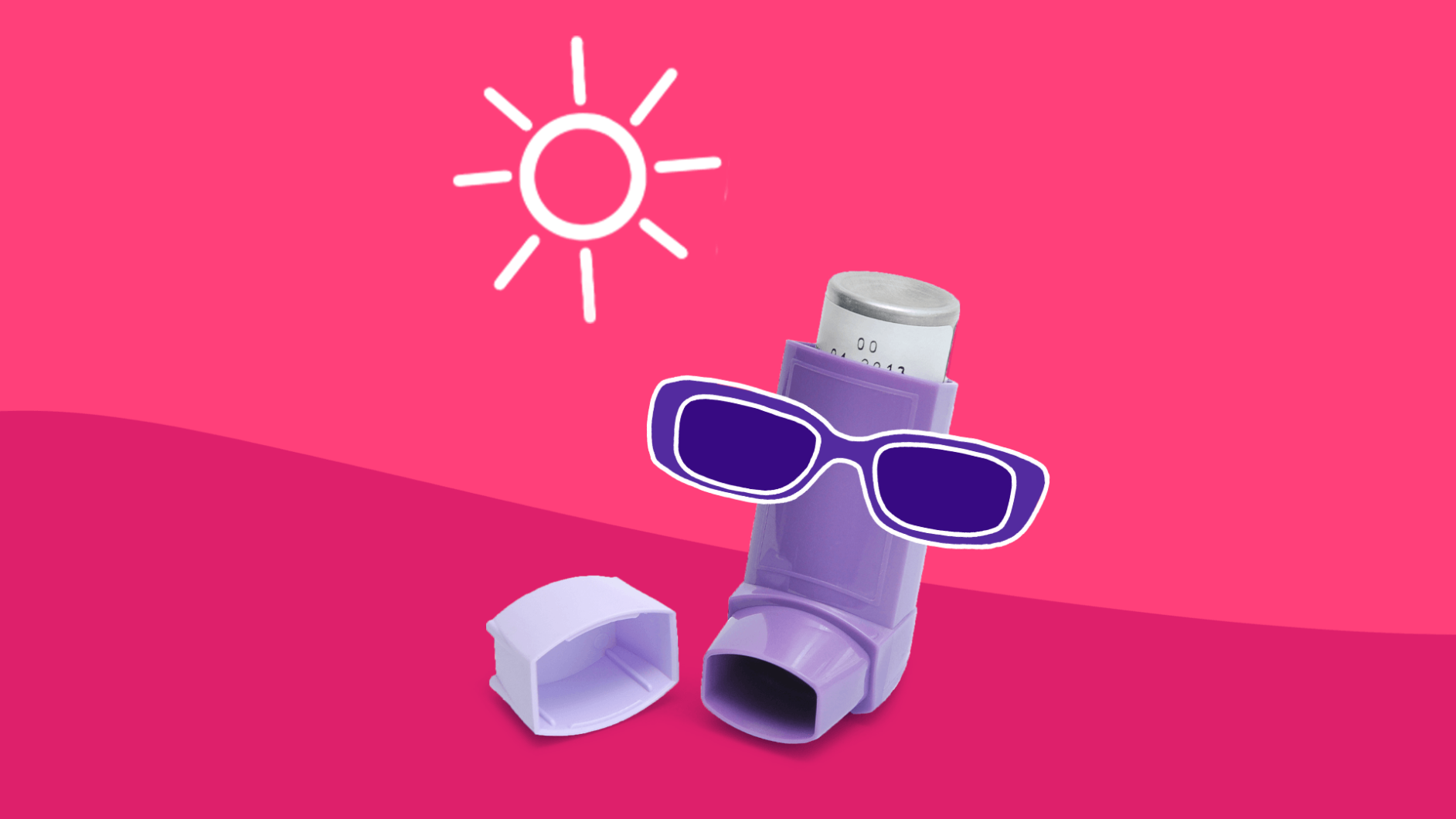Most people love the warmer weather that summer brings. But if you live with asthma, then you know that those hot humid temperatures can cause your asthma symptoms to flare up. That warm, moist, heavy air is difficult for anyone to breathe. But if you have asthma, it can lead to constricted airways resulting in common asthma symptoms like coughing and wheezing. In many areas summer weather also means an increase of pollen and pollution that can also affect summer asthma symptoms.
Causes of summer asthma
The following environmental factors can trigger heat-induced asthma symptoms during summer months:
- Heat: “Heat is associated with poor air quality including high ozone levels, particulates,” says Pierrette Mimi Poinsett, MD, a medical consultant at Mom Loves Best. “It is the components of poor air quality that trigger asthma. Hot air can also cause airways to narrow, precipitating bronchospasm.”
- Humidity: Studies show that humid air can trigger bronchoconstriction in people who have asthma. The best temperature for someone who has asthma is between 68 to 71°F with low humidity since this will not constrict their airways. Additionally, “humid air can trap pollutants, pollen, and mold which also triggers asthma,” says Dr. Poinsett.
- Extreme weather changes: Whether it’s lots of heat, sudden rain, or blasts of ultra-cold air from the air conditioning, any drastic environmental condition might exacerbate symptoms. Research shows that asthma symptoms get worse when you’re exposed to extreme heat and precipitation.
- Air pollution: “In heat, we see more airborne pollution that can add to lung stress,” says Sumana Reddy, MD, a provider at Acacia Family Medical Group in Prunedale, California.
- Allergens: Mold and dust mites thrive in hot humid air, which irritates the lungs and can trigger asthma symptoms. While it may seem like humidity allergies, it’s actually the humidity making the allergens worse to breathe in. “Humid air can trap pollutants, pollen, and mold, which also triggers asthma,” explains Dr. Poinsett.
- Thunderstorms: The extreme rain that occurs during thunderstorms can cause pollen to break up. Then, it is easier to breathe in the pollen particles since they are smaller, and those particles irritate the lungs of people with asthma.
- Smoke: Whether it’s from a barbecue, camp fire, or burning wildfires in your area, it’s likely you’re exposed to more outdoor smoke than usual from June through September. Smoke is an asthma trigger any time of year. Outdoor smoke, particularly from wildfires, is associated with respiratory problems, like chronic obstructive pulmonary disease (COPD).
- High ozone levels: “Ozone levels increase as well” during summer months, explains Dr. Reddy. While there’s not conclusive evidence it’s bad for your respiratory system, some studies suggest that high ozone can exacerbate asthma—and worsen lung function for people with asthma and those without. “In these cases use your Albuterol or other short acting inhaler,” Dr. Reddy says.
The common theme? The outdoor air is a little more difficult to breathe during the summer because of the factors above, and that can exacerbate asthma.
RELATED: 6 asthma attack triggers
8 ways to manage asthma in the summer heat and humidity
Often for chronic respiratory conditions, like asthma, prevention of flare-ups is the best treatment. “Preventative measures include using air conditioners to reduce humidity and pollution, changing the air condition filter every season, having your rescue inhaler available at all times and using it when there is cough or chest tightness,” says Noha Polack, MD, a pediatrician at Progressive Pediatrics in Union City, New Jersey.
Dr. Poinsett and Dr. Reddy recommend the following steps to manage asthma and avoid triggers during the summer months:
- Have an asthma action plan that you create with your healthcare provider. This is a very specific document that is based on the numbers when you breathe into a peak flow meter and your symptoms.
- Monitor your peak flows or your ability to push air out of your lungs based on your action plan.
- Use your rescue medications as needed for flare-ups and always carry it with you.
- Follow weather reports that address air quality and pollen counts. When the air quality is poor, avoid spending a lot of time outdoors. The same goes for high pollen count, which is usually in the mornings from 6 a.m. to 10 a.m. If you do go outside, take a shower when you go indoors to remove any pollen that may be on your body, clothes, or hair.
- Use nasal steroid spray and oral antihistamine medications regularly to help with seasonal allergies. Or, try saline nasal washes during times of high pollen counts.
- Stay hydrated. Dehydration may lead to faster breathing and worsening exposure to the allergens.
- Wear a particulate filter mask if any concern of fires or other extreme air pollution events.
- Optimize your indoor air. Use a dehumidifier and an air conditioner with clean air filters.
“Controlling allergies is an important part of avoiding asthma flare-ups,” Dr. Reddy says. “Many people do not realize that untreated or ignored allergies can be a source of their tiredness or difficulty with exercise. Sometimes asthma can be as subtle as feeling more shortness of breath while exercising and we can ignore it thinking that we are just out of shape.”
RELATED: Asthma treatments and medications
When should you see a healthcare provider?
“During the summer months if you notice a decreased peak flow based on your action plan then you would need to seek out a doctor’s care,” Dr. Poinsett says. She also recommends seeing your healthcare provider if you notice the following symptoms:
- Your symptoms do not improve after taking medications.
- You have increased coughing or wheezing.
- You need increased use of your inhaler.
- Your symptoms cause you to wake up in the middle of the night.
It is important to have regular checkups with your healthcare provider regarding your asthma management and frequent communication with your healthcare provider if you are concerned about any of your symptoms.











